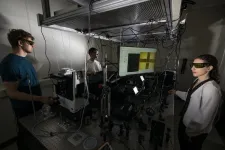(Press-News.org) A research team at the Texas A&M School of Veterinary Medicine and Biomedical Sciences (VMBS) has received a $5 million grant from the United States Department of Defense’s Defense Threat Reduction Agency to support the detection and prevention of brucellosis in Armenia.
Brucellosis, which is caused by several bacterial species of Brucella, is a zoonotic disease that can spread to humans from dogs and major livestock species, including cattle, pigs, sheep, and goats. It can have a major impact on a country’s public health and agricultural economy.
The team of Texas A&M researchers, led by VMBS Associate Professor Dr. Angela Arenas, will conduct a five-year study of brucellosis in Armenia to evaluate the presence and prevalence of each Brucella species in animals and dairy products; to improve local detection capabilities; and to provide education and training to Armenian scientists, policymakers, and community members.
Their work will be conducted in partnership with the Reference Laboratory for Especially Dangerous Pathogens (RLEDP), part of Armenia’s Republican Veterinary-sanitary and Phytosanitary Center of Laboratory Services.
“Brucellosis is one of the most common diseases transmitted from animals to humans in resource-limited settings,” Arenas said. “It poses a significant threat to humans due to the high risk of infection from the consumption of unpasteurized milk and its products.
“In Armenia, the nature and extent of the disease remain unknown,” she said. “This project will allow us to better understand the situation in order to develop appropriate countermeasures to stop the disease spread.”
Brucellosis: An International Threat
Brucellosis is currently widespread and underdiagnosed in many countries like Armenia, largely because of a lack of local disease awareness and diagnostic capacity.
Previous studies have shown that many infected Armenians had consumed unpasteurized dairy products and that the country’s veterinarians and physicians have a lack of awareness of the disease and its symptoms.
Although brucellosis can spread between animals and to people, it causes different symptoms in each; infected animals tend to have reproductive problems, while infected people can have broad symptoms ranging from lifelong infection to a serious acute illness similar to malaria.
According to the U.S. Centers for Disease Control and Prevention, brucellosis is included in the second-highest category of potential bioterrorism agents because of its moderate ease to disseminate; its moderate morbidity rates; and its special diagnostic needs.
“Brucella is considered a biological threat due to the low number of bacteria required to cause infection,” Arenas said. “In addition, disease manifestation is non-specific, meaning that it causes generic flu-like symptoms, and it is, therefore, usually misdiagnosed.
“The research generated here will have a significant positive impact for the country because, for the first time, we will know the disease status and the risks,” Arenas said. “This research will allow the Armenian government to develop a control plan to stop the spread of brucellosis.”
By Megan Bennett, Texas A&M School of Veterinary Medicine and Biomedical Sciences
###
END
Texas A&M researchers receive $5 million to study brucellosis in Armenia
Brucellosis poses a significant risk of infection in humans from the consumption of unpasteurized milk and its products
2024-07-17
ELSE PRESS RELEASES FROM THIS DATE:
How effective is MS medication across racial and ethnic groups?
2024-07-17
MINNEAPOLIS – For people with relapsing-remitting multiple sclerosis (MS), a new study has found that the drug ofatumumab is more effective than teriflunomide at helping people across racial and ethnic groups reach a period of no disease activity. The study is published in the July 17, 2024, online issue of Neurology®, the medical journal of the American Academy of Neurology. Ofatumumab, a monoclonal antibody, is a newer drug for treating MS. Teriflunomide, an immunomodulatory agent, has been available for over a decade.
MS is a disease in ...
Study: Uninsured, Hispanic people less likely to be referred to care after stroke
2024-07-17
MINNEAPOLIS – Insurance coverage, ethnicity and location may all play a role in a person’s ability to receive care after a stroke, according to a study published in the July 17, 2024, online issue of Neurology® Clinical Practice, an official journal of the American Academy of Neurology.
“Receiving the right care after a stroke is crucial to recovery and minimizing disability,” said study author Shumei Man, MD, PhD, of the Cleveland Clinic in Ohio and a member of the American Academy of Neurology. “Unfortunately, decisions about care may be influenced by factors such as race, insurance, and geographic location. Our study ...
Most Afghans support women’s rights, especially when men think of their daughters
2024-07-17
A majority of people in Afghanistan support human rights for Afghan women, and men are especially likely to support women’s rights when primed to think about their eldest daughters, according to a study published July 17, 2024, in the open-access journal PLOS ONE, by Kristina Becvar and colleagues from the University of Massachusetts at Amherst.
Human rights groups have been concerned for the rights of Afghan women in particular since the Taliban took control of Kabul in 2021. Since then, Afghan ...
New antidote for cobra bites discovered
2024-07-17
Scientists at the University of Sydney and Liverpool School of Tropical Medicine have made a remarkable discovery: a commonly used blood thinner, heparin, can be repurposed as an inexpensive antidote for cobra venom.
Cobras kill thousands of people a year worldwide and perhaps a hundred thousand more are seriously maimed by necrosis – the death of body tissue and cells – caused by the venom, which can lead to amputation.
Current antivenom treatment is expensive and does not effectively ...
Ant insights lead to robot navigation breakthrough
2024-07-17
Have you ever wondered how insects are able to go so far beyond their home and still find their way? The answer to this question is not only relevant to biology but also to making the AI for tiny, autonomous robots. TU Delft drone-researchers felt inspired by biological findings on how ants visually recognize their environment and combine it with counting their steps in order to get safely back home. They have used these insights to create an insect-inspired autonomous navigation strategy for tiny, lightweight robots. The strategy allows such robots to come back home after long trajectories, while requiring extremely little computation and memory (0.65 kiloByte per ...
Soft, stretchy ‘jelly batteries’ inspired by electric eels
2024-07-17
Researchers have developed soft, stretchable ‘jelly batteries’ that could be used for wearable devices or soft robotics, or even implanted in the brain to deliver drugs or treat conditions such as epilepsy.
The researchers, from the University of Cambridge, took their inspiration from electric eels, which stun their prey with modified muscle cells called electrocytes.
Like electrocytes, the jelly-like materials developed by the Cambridge researchers have a layered structure, like sticky Lego, that makes them capable of delivering an electric current.
The self-healing jelly batteries can stretch ...
The most endangered fish are the least studied
2024-07-17
The most threatened reef fishes are also the most overlooked by scientists and the general public. That is the startling finding of a team of scientists led by a CNRS researcher.1 In a study to be published in Science Advances on July 17, they measured the level of human interest in 2,408 species of marine reef fish and found that the attention of the scientific community is attracted by the commercial value more than the ecological value of the fishes. The public, on the other hand, is primarily influenced by the aesthetic characteristics of certain species, such as the red lionfish ...
Mindfulness training may lead to altered states of consciousness, study finds
2024-07-17
Mindfulness training may lead participants to experience disembodiment and unity – so-called altered states of consciousness – according to a new study from researchers at the University of Cambridge.
The team say that while these experiences can be very positive, that is not always the case. Mindfulness teachers and students need to be aware that they can be a side-effect of training, and students should feel empowered to share their experiences with their teacher or doctor if they have any concerns.
Mindfulness-based programmes have ...
New technique pinpoints nanoscale ‘hot spots’ in electronics to improve their longevity
2024-07-17
When electronic devices like laptops or smartphones overheat, they are fundamentally suffering from a nanoscale heat transfer problem. Pinpointing the source of that problem can be like trying to find a needle in a haystack.
“The building blocks of our modern electronics are transistors with nanoscale features, so to understand which parts of overheating, the first step is to get a detailed temperature map,” says Andrea Pickel, an assistant professor from the University of Rochester’s Department of Mechanical Engineering. “But you need something with nanoscale ...
Study shows ancient viruses fuel modern-day cancers
2024-07-17
Peek inside the human genome and, among the 20,000 or so genes that serve as building blocks of life, you’ll also find flecks of DNA left behind by viruses that infected primate ancestors tens of millions of years ago.
These ancient hitchhikers, known as endogenous retroviruses, were long considered inert or ‘junk’ DNA, defanged of any ability to do damage. New CU Boulder research published July 17 in the journal Science Advances shows that, when reawakened, they can play a critical role in helping cancer survive and thrive. The study also suggests that silencing certain endogenous retroviruses can make cancer treatments work better.
“Our study shows that diseases ...
LAST 30 PRESS RELEASES:
Enzymes work as Maxwell's demon by using memory stored as motion
Methane’s missing emissions: The underestimated impact of small sources
Beating cancer by eating cancer
How sleep disruption impairs social memory: Oxytocin circuits reveal mechanisms and therapeutic opportunities
Natural compound from pomegranate leaves disrupts disease-causing amyloid
A depression treatment that once took eight weeks may work just as well in one
New study calls for personalized, tiered approach to postpartum care
The hidden breath of cities: Why we need to look closer at public fountains
Rewetting peatlands could unlock more effective carbon removal using biochar
Microplastics discovered in prostate tumors
ACES marks 150 years of the Morrow Plots, our nation's oldest research field
Physicists open door to future, hyper-efficient ‘orbitronic’ devices
$80 million supports research into exceptional longevity
Why the planet doesn’t dry out together: scientists solve a global climate puzzle
Global greening: The Earth’s green wave is shifting
You don't need to be very altruistic to stop an epidemic
Signs on Stone Age objects: Precursor to written language dates back 40,000 years
MIT study reveals climatic fingerprints of wildfires and volcanic eruptions
A shift from the sandlot to the travel team for youth sports
Hair-width LEDs could replace lasers
The hidden infections that refuse to go away: how household practices can stop deadly diseases
Ochsner MD Anderson uses groundbreaking TIL therapy to treat advanced melanoma in adults
A heatshield for ‘never-wet’ surfaces: Rice engineering team repels even near-boiling water with low-cost, scalable coating
Skills from being a birder may change—and benefit—your brain
Waterloo researchers turning plastic waste into vinegar
Measuring the expansion of the universe with cosmic fireworks
How horses whinny: Whistling while singing
US newborn hepatitis B virus vaccination rates
When influencers raise a glass, young viewers want to join them
Exposure to alcohol-related social media content and desire to drink among young adults
[Press-News.org] Texas A&M researchers receive $5 million to study brucellosis in ArmeniaBrucellosis poses a significant risk of infection in humans from the consumption of unpasteurized milk and its products









